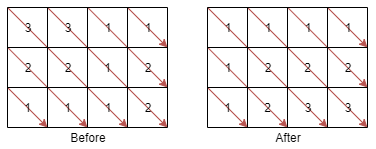Problem
A matrix diagonal is a diagonal line of cells starting from some cell in either the topmost row or leftmost column and going in the bottom-right direction until reaching the matrix's end. For example, the matrix diagonal starting from mat[2][0], where mat is a 6 x 3 matrix, includes cells mat[2][0], mat[3][1], and mat[4][2].
Given an m x n matrix mat of integers, sort each matrix diagonal in ascending order and return the resulting matrix.
Example 1:

Input: mat = [[3,3,1,1],[2,2,1,2],[1,1,1,2]]
Output: [[1,1,1,1],[1,2,2,2],[1,2,3,3]]
Example 2:
Input: mat = [[11,25,66,1,69,7],[23,55,17,45,15,52],[75,31,36,44,58,8],[22,27,33,25,68,4],[84,28,14,11,5,50]]
Output: [[5,17,4,1,52,7],[11,11,25,45,8,69],[14,23,25,44,58,15],[22,27,31,36,50,66],[84,28,75,33,55,68]]
Constraints:
m == mat.lengthn == mat[i].length1 <= m, n <= 1001 <= mat[i][j] <= 100
Solution
/**
* @param {number[][]} mat
* @return {number[][]}
*/
var diagonalSort = function(mat) {
let y = mat.length, x = mat[0].length - 1,
diag = new Uint8Array(y), k
for (let i = 2 - y; i < x; i++) {
diag.fill(101), k = 0
for (let j = 0; j < y; j++)
if (i+j >= 0 && i+j <= x)
diag[k++] = mat[j][i+j]
diag.sort(), k = 0
for (let j = 0; j < y; j++)
if (i+j >= 0 && i+j <= x)
mat[j][i+j] = diag[k++]
}
return mat
};
Explain:
nope.
Complexity:
- Time complexity : O(n).
- Space complexity : O(n).